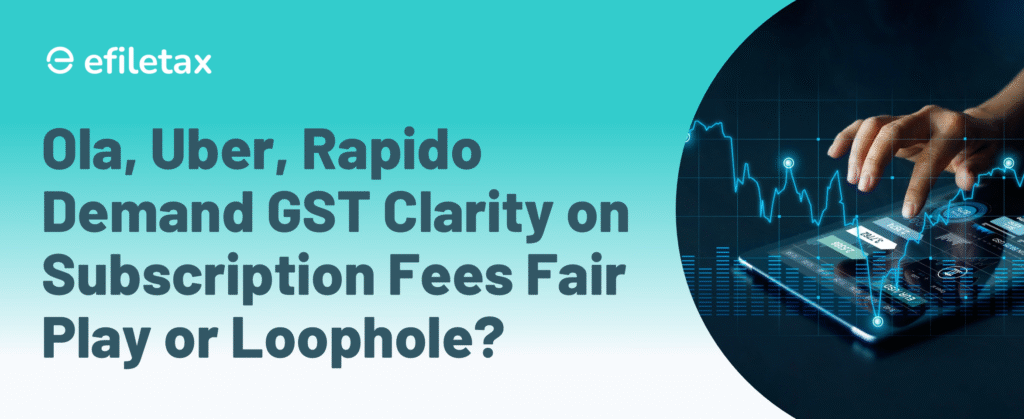
GST on Ride-Hailing SaaS Fees What’s the Issue?
Ride-hailing giants like Ola, Uber, and Rapido have recently urged the tax department to clarify GST on Ride-Hailing SaaS Fees. Many drivers now pay a fixed subscription fee instead of commission, raising confusion over whether GST applies uniformly.
This ambiguity is leading to unfair competition, with some platforms allegedly skipping GST on such fees altogether. Let’s break this down for Indian businesses and consultants.
How Does the Subscription Model Work?
- Earlier: Drivers paid a commission per ride (e.g., 20% of fare).
- Now: Many platforms offer a fixed weekly/monthly fee — a Software as a Service (SaaS) model — giving drivers unlimited access to bookings.
- Concern: Some companies may not be charging GST on this subscription fee, though technically, it’s a taxable supply under the CGST Act.
GST Law on SaaS Fees
Is GST Applicable?
✅ Yes, under Section 7 of the CGST Act, SaaS is a supply of services.
✅ Subscription fees are consideration for providing a digital platform.
✅ GST @18% generally applies to SaaS services in India.
Legal Basis:
- Section 7 (CGST Act, 2017) — Supply includes services for a consideration.
- Notification No. 11/2017-Central Tax (Rate) — Software services attract 18% GST.
- CBIC FAQs & Advance Rulings — Consistently treat SaaS as taxable.
Why Ola, Uber, Rapido Want Clarity
- Uneven compliance: Some operators pay GST, others don’t.
- Creates price gaps — compliant platforms lose competitiveness.
- Tax department may later raise demands with interest and penalties.
What Should Drivers & Aggregators Do?
✔️ Drivers:
- Check invoices for GST on subscription charges.
- Claim input tax credit if eligible and registered under GST.
✔️ Aggregators:
- Ensure proper GST invoicing on SaaS fees.
- Maintain clear records to avoid future disputes.
Expert Tip:
“Treat driver subscriptions exactly like any other SaaS billing — apply 18% GST, issue a proper tax invoice, and file it in your GSTR-1. This prevents surprise tax demands later.” — Efiletax Compliance Team
Possible Government Clarification
Industry insiders expect CBIC to issue a circular or FAQ soon, clarifying:
- That the fixed fee is taxable as ‘online information and database access or retrieval services’ (OIDAR) or SaaS.
- That platforms must uniformly charge and remit GST.
Stay tuned — Efiletax will update you as soon as the official clarification drops.
Quick Comparison: Commission vs SaaS Fee
| Basis | Commission Model | SaaS Subscription |
|---|---|---|
| Fee Type | % of fare per ride | Fixed weekly/monthly charge |
| GST Treatment | Service fee — taxable | SaaS — taxable |
| Risk of Non-compliance | Low (well-known) | High (new model, unclear to many) |
FAQs on GST for Ride-Hailing Subscriptions
Q1: Is the subscription fee mandatory?
A: Depends on the platform’s business model — some offer both options.
Q2: Can drivers claim GST credit?
A: Only if they have GST registration — mostly for fleet operators.
Q3: What happens if a platform skips GST?
A: The tax department may demand unpaid GST later, with interest and penalties.
Closing
GST on Ride-Hailing SaaS Fees is evolving. If you run an aggregator platform or are a driver unsure about your tax obligations, Efiletax can help you stay compliant and avoid surprises.
👉 Need help with your GST compliance? Contact Efiletax
Summary
Ride-hailing companies like Ola, Uber, and Rapido want the tax department to clarify GST on Ride-Hailing SaaS Fees. Many now charge drivers a fixed subscription fee instead of a commission. CBIC is expected to issue clear rules soon to curb non-compliance.